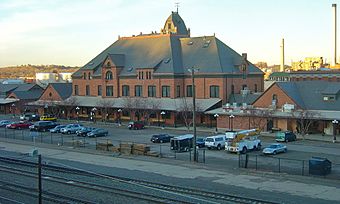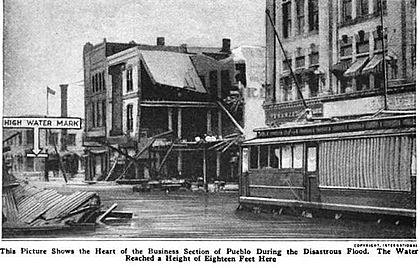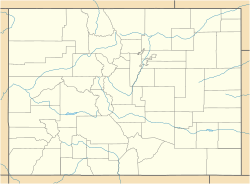Union Avenue Historic Commercial District facts for kids
Quick facts for kids |
|
|
Union Avenue Historic Commercial District
|
|

Union Depot, a prominent building in the district
|
|
| Location | Roughly bounded by railroad tracks, Main St., and Grand and Victoria Aves., Pueblo, Colorado |
|---|---|
| Area | 27 acres (11 ha) |
| Architect | G.W. Roe; P.P. Mills |
| Architectural style | Late Victorian |
| NRHP reference No. | 82001021 |
| Added to NRHP | December 28, 1982 |
The Union Avenue Historic Commercial District is an old business area in Pueblo, Colorado, USA. It has 69 important buildings, covering about 27 acres. Some famous spots include the Union Depot, the Vail Hotel, and the Quaker Flour Mill. In 1983, it was added to the National Register of Historic Places, which lists important historical places. This historic area was once part of smaller towns called South Pueblo and Central Pueblo. These towns later joined with Pueblo and Bessemer to form the city of Pueblo, Colorado. While it was still South Pueblo, a famous lawman named Bat Masterson helped protect a railroad being built.
Contents
History of Union Avenue
Not much is known about the very early days of this area. On maps from 1872, it was called 5th Street. The name Union Avenue first appeared around 1880. The Pueblo City Hall, also a historic building, played a big role in forming the modern city of Pueblo. It was decided that City Hall had to be located within this district.
Major Floods and Rebuilding

The Union Avenue area has faced several big floods. These floods caused a lot of damage locally and across the country. Before a large levee was built, a huge flood in 1921 devastated the district and most of Pueblo. This was the biggest flood in Pueblo's history.
A leader helping with recovery described the damage as "beyond description." Almost every building in the downtown area was destroyed. Water as deep as 18 feet covered the city. Over 1,500 people lost their lives. Pueblo was the main economic center of southern Colorado before the flood. So, the flood greatly hurt both the city's economy and the region's economy.
Many buildings in the district were first built in the 1880s. But because of the floods, especially the one in 1921, many were rebuilt or updated.
Bringing New Life to the District
Over time, some buildings started to show their age and needed care. In 1996, a big project began to fix up the district. The goal was to make it a center for culture and economic growth. The Historic Arkansas River Project follows the original path of the Arkansas River. The river's path was changed after the 1921 flood.
This project is special for Pueblo. It marks where the borders of France and Spain once met. Later, it was the border between the United States, Mexico, and the Republic of Texas. By 2001, the new Riverwalk was a success. It helped bring the district back to life. It also helped Pueblo's economy recover from a tough time.
Community Events and Famous Visitors
The Union Avenue Historic Commercial District is a popular spot for community events. Each year, events like the "B Street Bash" in June take place here. Oktoberfest is held in September. The autumn Pueblo Chile and Frijoles Festival also happens in the district.
Many well-known politicians have visited the district over the years. Pueblo Memorial Hall hosted the last public speech of then-President Woodrow Wilson. He spoke there to support the League of Nations. A plaque now marks this important speech.
The district was also the location for a rally during Barack Obama's presidential campaign on October 31, 2008.
Images for kids
-
A photo from Popular Mechanics Magazine after the 1921 flood.
 | William Lucy |
 | Charles Hayes |
 | Cleveland Robinson |





